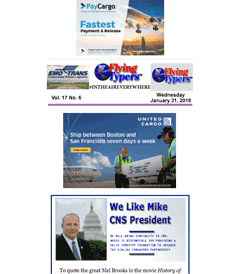|
It is interesting
to see the reaction from various parts of the industry as disrupters come
and present new concepts in improving the market place.
There is a fear of the unknown that takes
over and everybody huddles down to resist the changes taking place rather
than adapting to the new environment and looking for opportunities. The
airfreight industry has traditionally been lagging behind.
At the same time, our ocean cousins have
been far ahead in embracing the evolutionary process.
All you have to do is look at how far air
cargo has come in digitization during the last thirteen years since e-Freight
was introduced as a concept.
Some have evolved, but they are generally
held back because the majority of players haven’t moved forward!
Unfortunately, the lowest common denominator
tends to act as a drag and slows the industry from moving forward.
If you boil it all down, before we work
on process improvements, we need to work on mindset change.
The relationships between the various players
have to change for better transparency of processes, without any fear
of being pushed out of the equation.
The traditional “making a buck off
of each other” has to disappear.
New
Approach To Shippers
Our new approach must
embrace charging for services rendered as the order of the day. Freight
forwarders seem to be the most sensitive to the issue of being cut off
if there is direct interaction between the carriers and the shippers.
The fact remains that forwarders have nothing
to worry about in the airline partnership as they perform essential services.
Airlines
Need Forwarders
The reality is that a
carrier does not really have the infrastructure to deal with the forwarder
function.
Pure business logic says airline core competencies
are in creating distribution networks, domestic as well as trans-continental
cross borders with very capital-intensive assets, highly perishable capacity,
and very thin margins.
Maintaining
Distribution Networks
Airlines, in my experience,
would rather keep their eye on the ball and optimize their operations
to create a very cost effective and efficient distribution network. Airlines
tend to operate in one of the most regulated arenas and are very sensitive
to economic downturns.
This applies to all modes of transportation.
Unlike their passenger colleagues, cargo tends to be directional and empty
sectors can be a killer on their operating economics. Then, on top of
that, all you need is one diversion because of weather or any other reason,
and that can punch a big hole in the bottom-line.
No
Set Up For Logistics
So, for all the above,
airlines are unlikely to focus on creating a logistics network.
Put another way, the air cargo business
partnership is far better off letting the experts manage their specialties.
The story is the same on the shipper side.
To take on the infrastructure to effectively
manage logistics in the supply chain is an expensive option, so in most
cases shippers are likely to keep out-sourcing their logistics needs.
Forwarders are able to create economies
of scale from which the shippers can benefit.
Integrators:
A Horse of a Different Color
Integrators are different
and will remain different, as they tend to create a global system of efficient
first and last mile networks, operating their own aircraft on high-density
routes and using other carriers on low-density routes.
Integrators are basically a hybrid operation.
The downside is that their costs tend to
be extremely high.
Integrators tend to be extremely good when
dealing with small packages, but face challenges when dealing with complex
logistics requirements.
The
Sting
Integrators have
created their own forwarding subsidiaries that operate more on an autonomous
basis because of the incompatibility with process requirements for small
parcel express operations.
Other carrier’s benefit from their
business. The integrators are not really a threat to the traditional airline
operations as was feared in the late eighties and nineties.
Reality
Check
Activities in the e-tail
within the e-commerce business have changed the consumer behavior. It
is the fastest growing segment of the air cargo industry and will remain
so for the foreseeable future. The key to being a successful player in
this space lies in the efficiency of your last mile delivery (LMD) capability.
This where the forwarders and, nowadays,
even the integrators are struggling. Forwarders LMD tend to be job based
and integrators, schedule based.
Looking
For A Nice Niche
The likes of Amazon Prime
now require flexible LMD with very short delivery periods.
This poses challenges for both entities
and this is where smaller localized LMD operators tend to find a nice
niche.
Focus is on the success rate of first attempt
delivery.
As the express business transcends from
B2B to more B2C, it brings challenges to the operators.
This is where even integrators are subcontracting
more and more to local operators in support of their own infrastructure,
thus boosting and creating more opportunities in the local industry.
Smart
Boxes
Enter the era of smart
ideas and new technology in the form of remote collection smart boxes,
which are also becoming more integrated into the fabric of LMD.
Shippers
Through The Looking Glass
Shippers can be viewed
as partially responsible for slowdowns in the process.
Think abut it.
Shippers always complain about lack of
transparency whilst they are best placed to create transparency for themselves
and share it with all that need to know the full status. They hold the
master record, so all service providers have to just push their piece
of information to this master and if this information is then shared with
all, it will help in creating better process efficiency. Shippers are
also reluctant to remunerate the forwarder and look for extended credit
periods.
The fact remains that with growing and
booming e-commerce activity, many shippers get paid before the consumer
receives the goods.
Hopefully, the newer generation growing
up in a ‘pay as you buy’ atmosphere will be helpful in creating
better cash flow in the system, and service providers (read airlines &
forwarders) will get paid fairly and quickly for the services rendered.
Crunch
Time & Agents of Change
Now, here is the
crunch.
If the air cargo industry thinks that it
can continue to operate the way it has previously as it moves into the
future, they might not see the future.
Market place is now very common in every
segment of the industry, be it hospitality, air travel, or shopping.
Folks like Expedia, Kayak, etc. have changed
the way these industries operate. Amazon and Alibaba have changed the
way consumers behave.
It is only a matter of time before major
change happens in air cargo industry.
Folks like Freightos are bringing the market
place concept to the freight market. Flexport is driving the development
of virtual forwarder.
TAC (The Air Cargo) Index is bringing in
fresh transparency in market rates/pricing. So, resisting the change is
only postponing the inevitable.
My view is spending more time adapting
to the new environment will be more beneficial than resisting this change,
which in a worse case scenario could lead to extinction.
Information,
For Instance
The new generation is
now accustomed to instant information and services.
They are not going to wait for days to
get a rate quotation when it will be readily available in the likes of
Freightos’ market place, which will give them one price for all
the services they want within moments… and with a choice of service
providers, probably with price comparisons.
Wake
Up Call
The industry should pay
attention to the evolution of technologies, like 3-D printing, and geo-political
aspects of on shoring and near shoring, which will change the way traditional
supply chain operations work.
The good news is that driven by the e-commerce
activities, air cargo will continue to be a growing market.
The new market place is going to create
greater market access and volumes are likely to grow bigger as everyone
will have access to the industry. Shipping goods will no longer be a cumbersome
activity for Joe Blog.
This in itself will be a great catalyst
in growing the market place.
So, it is time to deal with reality and
join the evolutionary process.
Ram
Menen
 Ram
Menen, one of the original founding team of Emirates Airline, headed
its cargo division since its inception in October 1985. Ram
Menen, one of the original founding team of Emirates Airline, headed
its cargo division since its inception in October 1985.
With Ram Menen at the helm, the airline
rose to become the largest international cargo airline in the world
in 2012.
Mr. Menen retired from Emirates in June
2013 as the Divisional Senior Vice President Cargo.
Ram began his career in aviation in
1976 at Kuwait Airways later moving to British Airways to head its
cargo operations in Kuwait.
In 1984, he joined the Kuwaiti aviation
group Alghanim Al Qutub Shipping Agencies, to set up and manage its
airfreight-forwarding unit in Dubai.
Trained as an engineer, he spearheaded
the conceptualization and development of the LD-36 (AMF) type of ULD
(Unit Load Device) which increased usable space on each lower deck
pallet base by 33%. Ram also helped develop the cool dollies, which
are extensively used at some airports to maintain the integrity of
the cool chain on the ramp.
Ram is a FCILT (Chartered Fellow of
the Chartered Institute of Logistics & Transportation), as well
as, FRAeS (Fellow of the Royal Aeronautical Society).
He is one of the founding members of
The International Air Cargo Association (TIACA), serving as Vice President
in 1993 and 1994, and as President, CEO and Chairman of the Board
in 1995 and 1996.
Ram Menen has won every major award
given by industry publications.
Today, with his wife Malou, he splits
his time between homes in Luxembourg and Kuala Lumpur.
Their son Ram Menen Jr. continues in
the family transportation tradition. Ram Jr. is currently employed
by Wallenborn. |
| 



 Vol.
17 No. 6
Vol.
17 No. 6 Vol.
17 No. 7
Vol.
17 No. 7